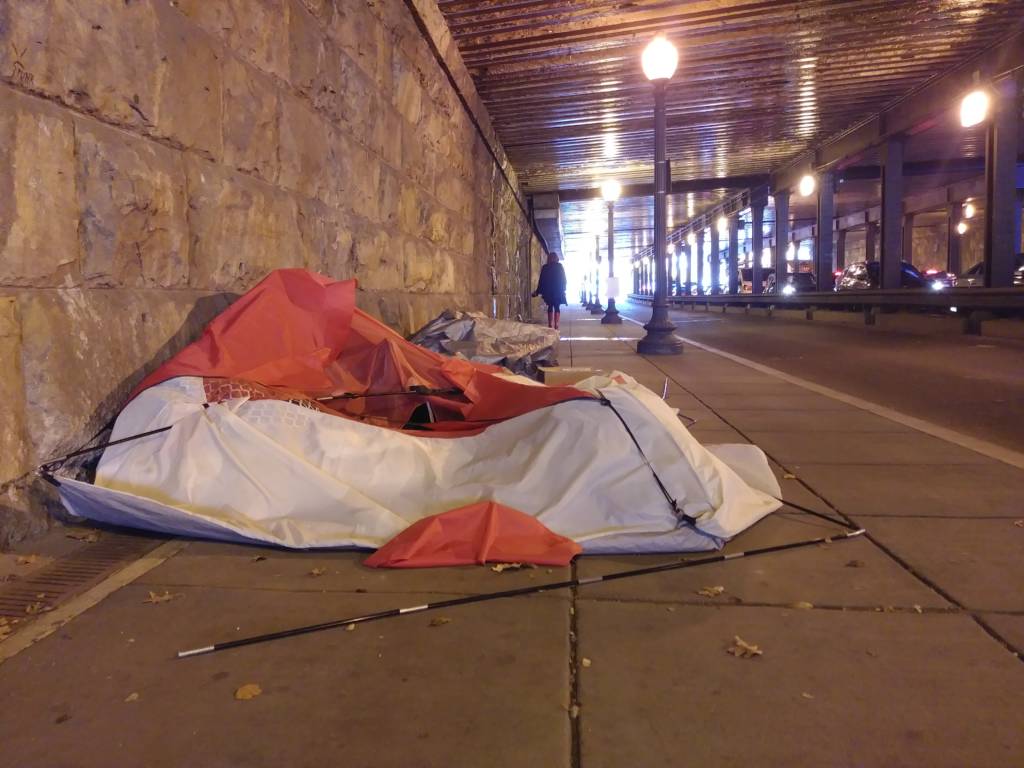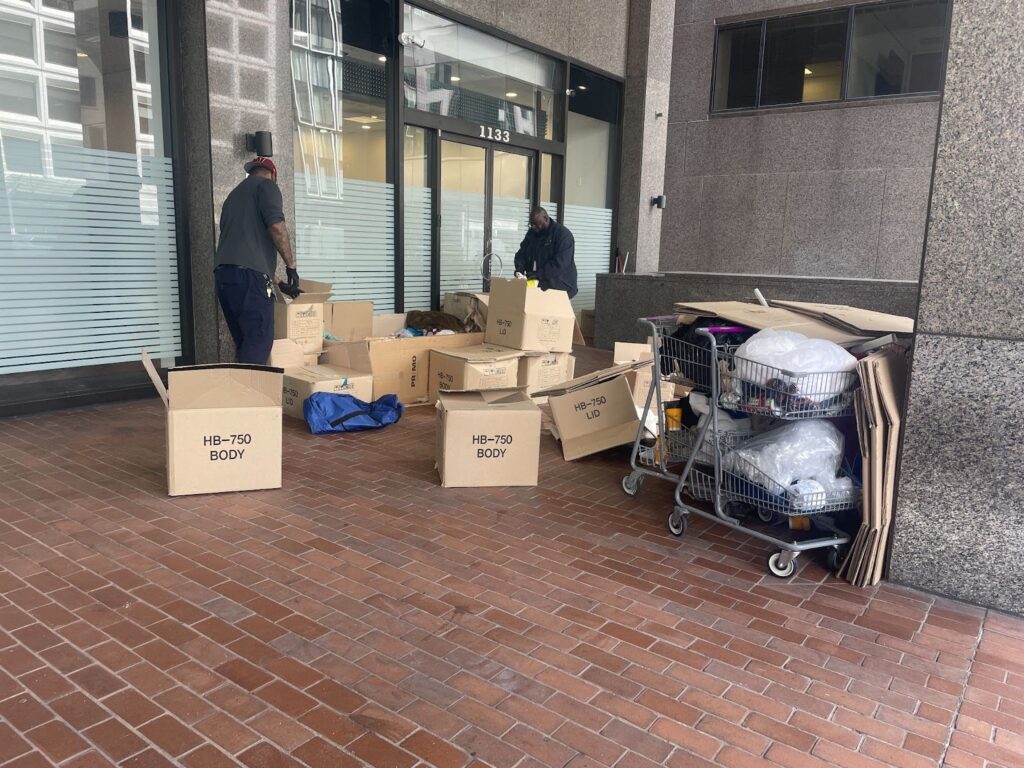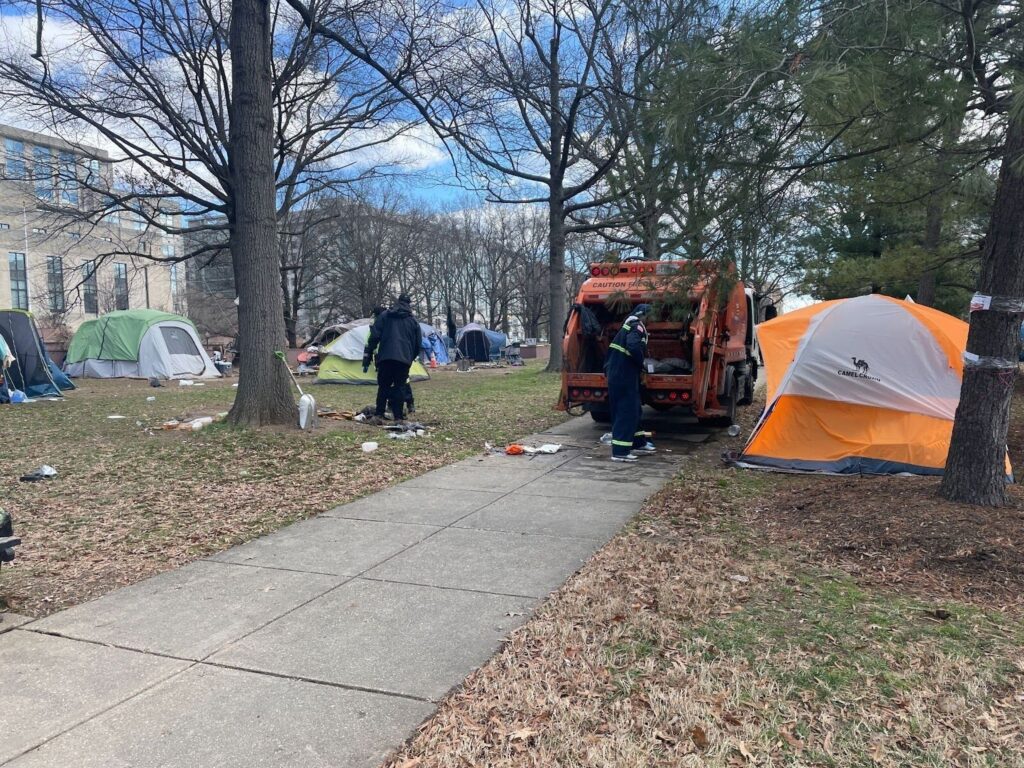For two hours on the morning of Nov. 8, the NoMa Business Improvement District provided free pancakes, coffee and orange juice on M Street NE. A local guitarist was hired to play during the festivities, which aimed to celebrate the new light installation in the underpass there, “Rain.” It is the first of three “Underpass Art Parks” undertaken by the NoMa Parks Foundation.
Hey look at that, banana pancakes @NoMaBID metro station. pic.twitter.com/HbVbI7bQAy
— Jill Cashen (@jillcashen) November 8, 2018
A block away, at least six people experiencing homelessness had been forced out of the L Street underpass. One of them was also a local musician. “The neighborhood dubbed me ‘The Sound of NoMa,’” said Melvin, who has been homeless in the District for five years. “Some people who live in the apartments where Harris Teeter is bought me my first trumpet.”
Once he was able to stash his belongings, Melvin planned to find a place to play until he earned enough to buy a meal.
The celebration on M Street coincided with a bi-weekly encampment “cleanup” coordinated by the Office of the D.C. Deputy Mayor of Health and Human Services.
As Street Sense Media previously reported, NoMa BID often assigns a crew to follow behind city workers to powerwash the underpasses after a cleanup occurs.

People experiencing homelessness had been taking shelter in the M Street underpass until fences were put up in January to make way for the Rain installation.
[Read more: D.C. clears out homeless camps ahead of art display]
In addition to the cleanup on Nov. 8, one of the sidewalks in the L Street underpass was scheduled to be closed for construction of the second art installation, “Light Weave.” The third is planned for the Florida Ave., NE underpass.
#NoMa reminder: Around midday today the *north sidewalk* of the L Street NE underpass will be closed to pedestrians. There will be signs directing people to use the south sidewalk. Watch for more news soon! https://t.co/srCAEY8C8g pic.twitter.com/6wfERJrJRa
— NoMaParksFoundation (@NoMaParksDC) November 8, 2018
All three artistic light installations aim to address security concerns for pedestrians. Security cameras were also installed as part of the M Street project. Two million dollars of grant funding was set aside to complete the projects.
“I understand though,” Melvin said of the clean-ups that have been held every two weeks for the past two months. “It could be an eyesore, with all these new buildings going up.”
The clean-ups started earlier than scheduled. But everyone camping in the area and willing to talk was prepared to move. “You get used to it,” multiple campers said independently.

Camp residents here and elsewhere have become accustomed to moving off-site when city crews come through and returning the same day after the clean-up effort.
This practice was called into question on Nov. 8, however. People living on First St. NE sidewalks next to Union Station had moved their belongings away from the cleanup signs. But federal officers informed them the place they habitually move to during cleanups is federal property. Their belongings could not be there, either.
They moved across the street, back on city property and waited to move back to the initial tent sites.
It is illegal to live in a tent, car or other “temporary abode” on public lands in D.C. without the express permission of the mayor. Rather than criminalize this activity with tickets or arrests, the city adheres to its cleanup protocol, which includes providing two weeks’ notice.
“To me, it just seems like a way to make people feel uncomfortable every two weeks,” said another musician who watched the events on First Street. He frequently plays in the area and is friends with some of the campers.
The Bowser administration ramped up encampment enforcement just ahead of Thanksgiving 2015, during her first year in office. The Office of the Deputy Mayor for Health and Human Services says it is challenging because many campers refuse what services they are offered, including city shelters.

Some campers said it is challenging to trust others, including service providers who require personal information to do their work.
“I don’t trust nothing out here,” said Monica, a camp resident who Street Sense Media also interviewed during an October cleanup. She described the murder of a man living in the camp, a close friend, who was shot four times Halloween night.
“Right in front of the Postal Museum with all those cameras. And nobody knows what happened?” Monica said rhetorically. “People ask, ‘Do I want their help?’ No, I don’t. I don’t trust anyone.”








